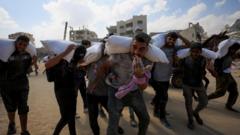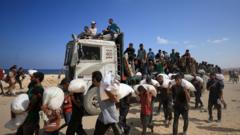A senior U.N. official's visa denial symbolizes strained relations and humanitarian challenges in the ongoing Israeli-Palestinian conflict.
Israeli Government Denies Visa Renewal for U.N. Humanitarian Chief Amid Conflict

Israeli Government Denies Visa Renewal for U.N. Humanitarian Chief Amid Conflict
Israel's foreign minister cites bias as tensions grow over Gaza relief efforts.
Israel has officially declined to renew the visa of Jonathan Whittall, a key United Nations official responsible for coordinating humanitarian efforts in Gaza and the occupied West Bank, as announced by the country’s foreign minister Gideon Saar. This decision, made public on Sunday, highlights the escalating frictions between the Israeli government led by Prime Minister Benjamin Netanyahu and the U.N. organization amid the ongoing humanitarian crisis in the region.
Saar criticized Whittall, who serves as the acting head of the Office for the Coordination of Humanitarian Affairs (OCHA), accusing him of exhibiting “biased and hostile conduct against Israel.” This follows a pattern, as Whittall's predecessor, Andrea De Domenico, was also forced out under similar circumstances after the previous Israeli foreign minister denied his visa extension.
The U.N. agency, OCHA, confirmed that Whittall's visa will not be extended past August, citing his comments regarding the plight of Gazans in search of food at aid distribution points as a probable impetus for the decision. In a statement, OCHA emphasized that addressing conditions on the ground is central to their mission. They remarked, “Attempts to silence us are not new, but threats of reduced access to the civilians we’re trying to serve are intensifying.”
Tensions flared further on the same day the visa announcement was made, as Israeli troops reportedly opened fire near a border crossing, resulting in multiple Palestinian casualties amid the entry of U.N. aid trucks, according to the Gaza health ministry.
The United Nations has been vocal about the critical humanitarian crises stemming from Israel's ongoing military operations against Hamas, which began following an attack on October 7, 2023, that resulted in significant loss of life and hostage situations. The ongoing conflict has seen over 57,000 casualties in Gaza, a figure that does not distinguish between civilians and combatants, and indicates a deep humanitarian crisis with widespread displacement and food shortages—the World Food Program reported that nearly one-third of the population is going days without food.
Whittall, known for his outspoken critique of Israeli relief policies, has branded the current situation as a form of “weaponized hunger,” highlighting the dire consequences faced by desperate families seeking assistance. “What we are seeing is carnage,” he stated in June. “It’s a death sentence for people just trying to survive.”
As the humanitarian situation deteriorates, the implications of these bureaucratic decisions become increasingly alarming for millions in Gaza who depend on international aid for survival.





















